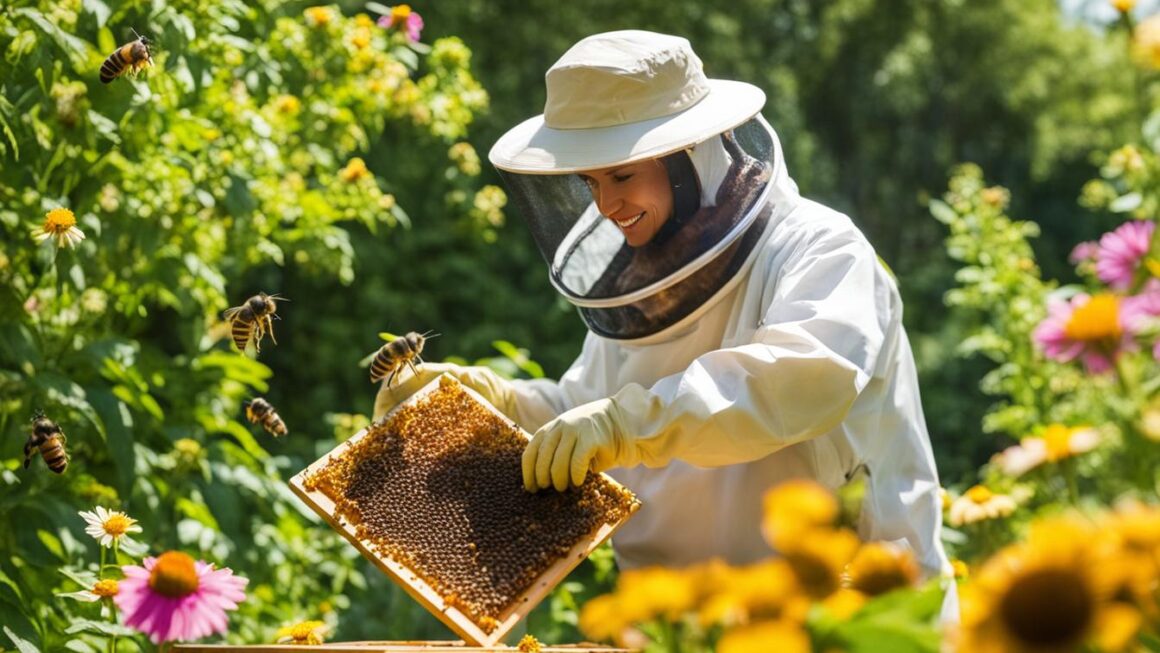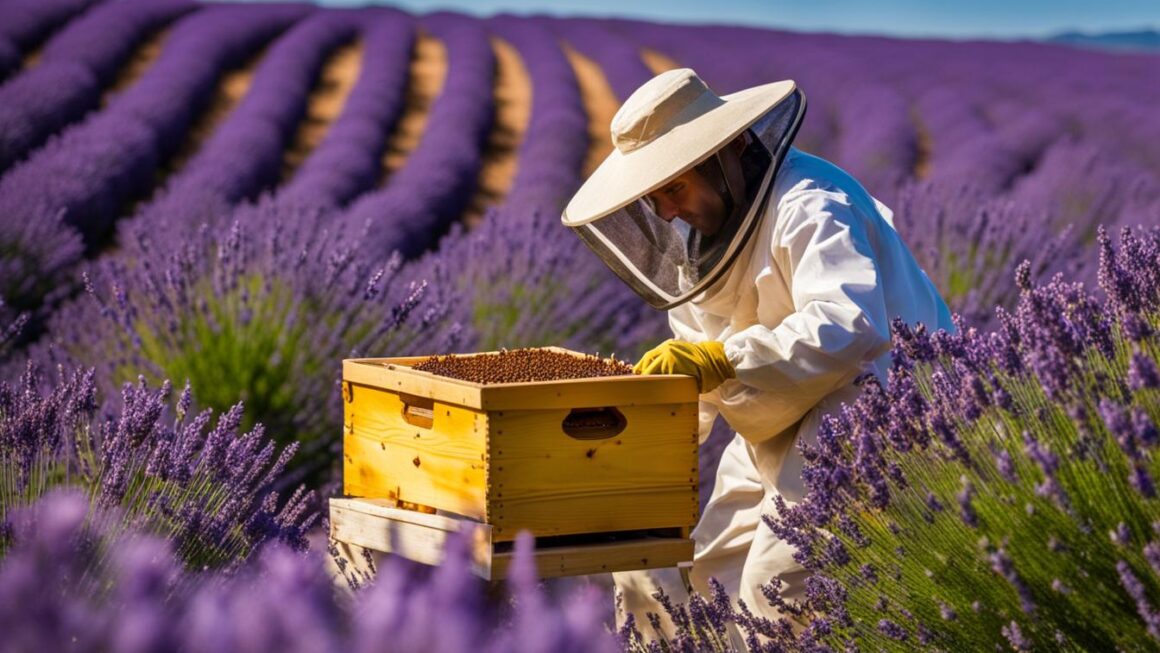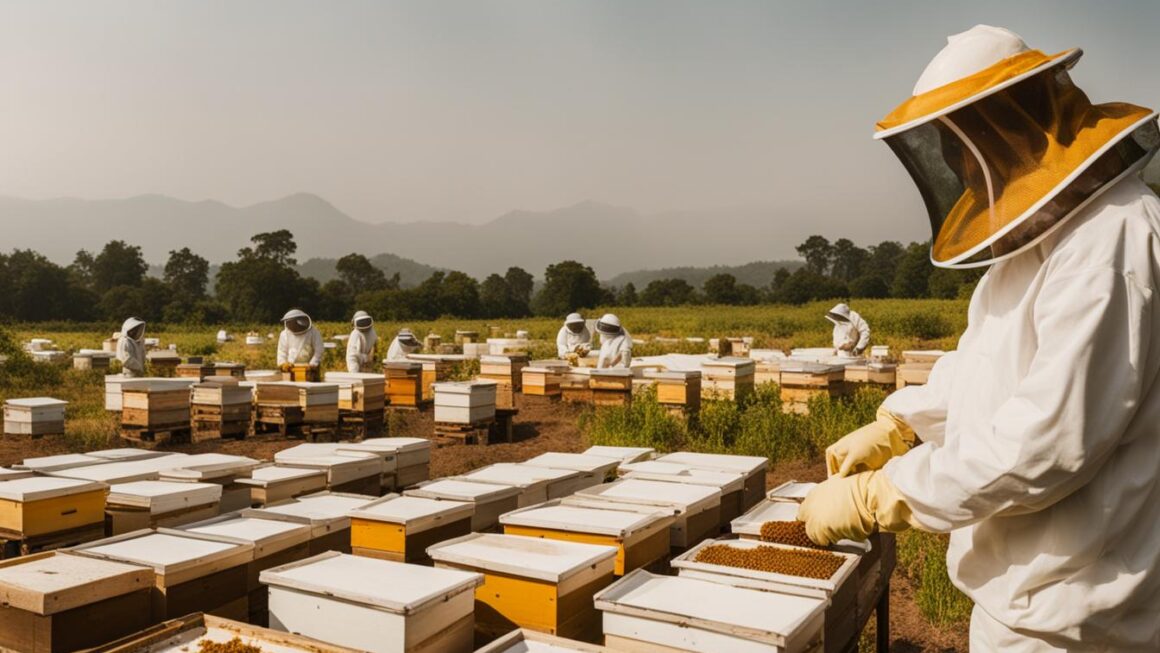Italian honey bees are renowned for their gentle nature and abundant honey production. They are highly sought after by beekeepers around the world, particularly in Italy. The Italian Honey Bee Queen plays a crucial role in the hive, ensuring the growth and productivity of the colony. Beekeepers often choose Italian honey bees for their honey production, as they produce a considerable amount of high-quality honey that can be harvested and sold.
Key Takeaways:
- Italian honey bees are known for their gentle nature and abundant honey production.
- The Italian Honey Bee Queen is responsible for laying all the eggs and ensuring the growth of the colony.
- Italian honey bees are popular among beekeepers for their high honey production.
- Italian honey bees can be purchased from reputable breeders and suppliers.
- Italian beekeeping emphasizes sustainable practices and the preservation of honey bee populations.
The Role of the Italian Honey Bee Queen in the Hive
The Italian Honey Bee Queen plays a vital role in the hive, serving as the central figure responsible for the growth and development of the colony. As the only female bee capable of reproduction, the queen bee’s primary function is to lay eggs. She is larger in size compared to the worker bees and possesses specialized reproductive organs.
During the nuptial flight, the queen bee mates with drones and stores their sperm for future egg-laying. She returns to the hive and lays eggs in the cells, which hatch into larvae and eventually develop into adult bees. The presence and health of the queen bee are crucial for the overall success of the hive, as she ensures the continuous production of new bees to replenish the workforce and sustain the colony’s population.
H3: Hive Dynamics and Colony Growth
The queen bee’s role in the hive goes beyond egg-laying. Her pheromones also play a significant role in regulating the behavior and communication among the bees in the colony. The queen bee releases a combination of pheromones that serve as signals to the worker bees, influencing their behavior, and keeping the colony cohesive.
Additionally, the queen bee’s influence extends to colony growth. When the population of worker bees reaches a certain threshold, the queen bee may initiate swarming, a natural process where a portion of the bees, along with a new queen bee, leaves to establish a new colony. This process allows for the expansion of honey bee populations and the colonization of new areas.
| Role of the Italian Honey Bee Queen | Description |
|---|---|
| Egg-Laying | The queen bee is responsible for laying eggs, ensuring the continuous growth and replenishment of the colony. |
| Pheromone Regulation | The queen bee emits pheromones that influence the behavior and communication of the worker bees, maintaining colony cohesion. |
| Colony Growth | When a colony reaches a certain size, the queen bee may initiate swarming, leading to the establishment of new colonies. |
Characteristics of Italian Honey Bees
Italian honey bees are highly regarded for their gentle nature, making them a preferred choice for beekeepers. Their calm temperament and reduced tendency to sting make them easier to handle during hive management. These bees exhibit a natural docility that allows beekeepers to work with them more comfortably, reducing the risk of disturbances that may disrupt the hive or cause harm to the beekeeper. This trait, combined with their exceptional honey production capabilities, has made Italian honey bees highly sought after in the beekeeping industry.
Aside from their gentle nature, Italian honey bees are known for their prolific honey production. These bees have an impressive foraging behavior that involves efficient nectar and pollen collection. Their strong instinct for seeking out floral resources and their ability to process and convert those resources into honey contribute to their high productivity. Beekeepers benefit from this characteristic as they can obtain substantial honey yields from Italian honey bee colonies, making them ideal for commercial honey production.
Italian honey bees also possess noteworthy disease resistance, which is a crucial attribute for maintaining hive health. These bees have shown greater resistance to certain diseases that can negatively impact bee colonies, such as American foulbrood and chalkbrood. With their robust immune systems, Italian honey bees are better equipped to combat these diseases, reducing the risk of devastating losses for beekeepers. This resilience contributes to the overall sustainability and vitality of Italian honey bee colonies, making them a reliable choice for beekeeping endeavors.
| Characteristics | Description |
|---|---|
| Gentle Nature | Italian honey bees have a calm temperament and reduced tendency to sting, making them easier to handle for beekeepers. |
| Honey Production | Italian honey bees are exceptionally productive in terms of honey production, benefiting beekeepers seeking high yields. |
| Disease Resistance | Italian honey bees exhibit greater resistance to certain diseases that can impact bee colonies, contributing to hive health and sustainability. |
| Foraging Behavior | Italian honey bees possess a strong instinct for foraging and efficiently collect nectar and pollen from floral resources. |
“Italian honey bees are a joy to work with as they exhibit a gentle nature and are less prone to aggressive behaviors. Their ability to produce abundant honey and demonstrate disease resistance makes them a valuable asset for any beekeeping operation.”
Italian Honey Bees for Sale
If you are interested in starting your own beekeeping journey with Italian honey bees, you can find them for sale through reputable bee breeders and suppliers. These trusted sources offer various options, such as hive packages or nucleus colonies, to suit different beekeeping setups and preferences.
When buying Italian honey bees, it is crucial to ensure that you are purchasing from a reputable breeder. Look for breeders who have a proven track record of providing healthy and high-quality bees. You can do this by researching online reviews and consulting with experienced beekeepers for recommendations.
Here are a few considerations when buying Italian honey bees:
- Choose between hive packages or nucleus colonies: Hive packages come with a queen bee and a certain number of worker bees, while nucleus colonies include a queen, worker bees, and brood. Select the option that best fits your beekeeping goals and the size of your hive.
- Ensure healthy bees: Inspect the bees before purchasing to ensure they appear healthy and active. Look for bees with plenty of energy, clean bodies, and no signs of disease or pests.
- Consider local climate and regulations: Italian honey bees are adaptable to various climates, but it’s important to consider your specific location and any regulations regarding beekeeping.
Table: Comparison of Italian Honey Bee Suppliers
| Supplier | Offerings | Price Range | Customer Reviews |
|---|---|---|---|
| Bee Happy Apiaries | Hive Packages, Nucleus Colonies | $150 – $300 | 4.5/5 |
| Honey Bee Central | Hive Packages, Queens | $120 – $250 | 4/5 |
| Italian Bee Company | Nucleus Colonies, Queen Cells | $200 – $400 | 4.7/5 |
Refer to customer reviews and ratings when choosing a supplier. Take into account factors such as availability, shipping options, and customer service. It is essential to make an informed decision to ensure the success of your beekeeping venture.
By purchasing Italian honey bees from reputable breeders, you can kick-start your beekeeping journey with healthy and productive bees. Enjoy the rewards of maintaining these fascinating creatures and contributing to the preservation of honey bee populations.
The Majesty of Italian Beekeeping
Italian beekeeping is a time-honored tradition that embraces the harmonious relationship between humans and bees. With a rich history and deep-rooted traditions, Italian beekeeping has flourished for generations, passing down knowledge and techniques from one lineage to another. This art of beekeeping focuses not only on honey production but also on sustainable practices that prioritize the long-term health and vitality of the honey bee populations.
Italian beekeepers take pride in their commitment to sustainability, ensuring that their practices have minimal impact on the environment. They prioritize the health and well-being of the bees, implementing measures to preserve biodiversity and protect honey bee colonies from diseases and pests. By prioritizing sustainable practices, Italian beekeepers contribute to the conservation of honey bee populations and the overall well-being of our ecosystems.
Honey production is at the heart of Italian beekeeping. The fine craftsmanship and dedication of Italian beekeepers result in the production of high-quality honey with unique flavors. The diverse flora and geographical variations in Italy contribute to the distinct taste profiles of Italian honey, making it highly sought after both locally and internationally. The authenticity and superior quality of Italian honey reflect the meticulous care and attention given by beekeepers throughout the honey production process.
Italian Beekeeping Traditions
Italian beekeeping traditions are deeply rooted in the cultural fabric of the country. Through the centuries, beekeepers have developed a profound understanding of honey bee behavior and have honed their skills in hive management. The passing down of knowledge from one generation to the next has ensured the preservation of these traditions, creating a strong sense of community amongst Italian beekeepers.
These traditions also extend to the production of other bee products, such as beeswax and propolis, which have long been used in traditional medicine and various artisanal crafts. Italian beekeepers continue to innovate and adapt their practices to embrace modern technology while preserving the rich cultural heritage of Italian beekeeping.
| Italian Beekeeping Traditions | Key Features |
|---|---|
| Passing Down of Knowledge | Generational transfer of beekeeping techniques and expertise. |
| Community Spirit | Strong sense of camaraderie and collaboration among beekeepers. |
| Respect for Nature | Emphasis on sustainable practices and environmental stewardship. |
| Artisanal Craftsmanship | Utilization of beeswax and propolis in traditional medicine and crafts. |
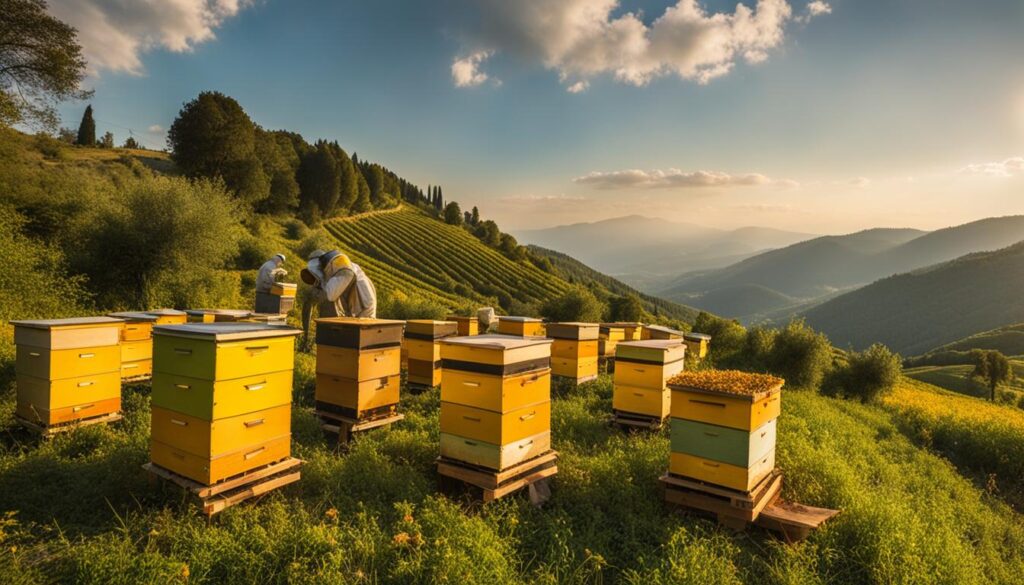
Italian beekeeping is not just a profession; it is a way of life that celebrates the magnificent presence of honey bees and the invaluable contributions they make to our ecosystems. Through their dedication to sustainable practices, Italian beekeepers demonstrate their commitment to the preservation of these remarkable pollinators for future generations.
Italian Honey Bee Information
If you are interested in learning more about Italian honey bees and beekeeping practices, there are various resources available. Beekeeping associations and organizations provide valuable information and support to beekeepers, offering resources, educational opportunities, and networking platforms. Beekeeping courses and workshops are also available, allowing individuals to gain hands-on experience and knowledge in beekeeping. These resources and educational opportunities can help aspiring beekeepers deepen their understanding of Italian honey bees and develop the necessary skills for successful beekeeping.
When it comes to beekeeping resources, there are several reputable organizations dedicated to providing information and support to beekeepers. These associations often offer publications, forums, and educational materials that cover a wide range of topics related to bees and beekeeping. They can provide valuable insights into Italian honey bee characteristics, hive management techniques, disease prevention strategies, and more.
In addition to beekeeping associations, there are also educational institutions and courses that specialize in beekeeping. These programs offer structured learning opportunities where individuals can gain a comprehensive understanding of beekeeping practices, including hands-on training in hive management, honey extraction, and bee health assessment. Whether you are a beginner or an experienced beekeeper, these educational opportunities can help enhance your skills and knowledge in Italian honey bee care.
| Resources | Benefits |
|---|---|
| Beekeeping Associations | Access to information, support, and networking opportunities |
| Beekeeping Courses and Workshops | Hands-on experience and structured learning |
| Publications and Educational Materials | In-depth knowledge on beekeeping practices |
By tapping into these beekeeping resources and educational opportunities, aspiring and experienced beekeepers alike can expand their knowledge and skills in Italian honey bee care. Whether you are looking to start your own beekeeping journey or improve your existing practices, these resources can provide valuable insights, support, and guidance.
Italian Honey Bee Facts
Italian honey bees are fascinating creatures with unique characteristics and behaviors. Here are some interesting facts about these remarkable bees:
“Italian honey bees are gentle and docile, making them a favorite among beekeepers. They are less likely to sting and are more tolerant of human presence, making them easier to handle and work with.”
Italian honey bees are known for their exceptional honey production. They have a strong instinct for foraging and are proficient at collecting nectar and pollen from flowers. This efficient foraging behavior allows them to consistently produce large amounts of high-quality honey.
Another remarkable characteristic of Italian honey bees is their resilience against certain diseases. They exhibit good disease resistance, making them less susceptible to common bee health issues. This resilience contributes to the overall health and longevity of their colonies.
| Italian Honey Bee Facts |
|---|
| Italian honey bees are gentle and docile, making them a favorite among beekeepers. |
| They are excellent honey producers, consistently producing large amounts of high-quality honey. |
| Italian honey bees have a strong instinct for foraging and are proficient at gathering nectar and pollen. |
| They exhibit good disease resistance, making them less susceptible to certain bee diseases. |
| Italian honey bees are commonly used in pollination services due to their efficient foraging behavior. |
| Italian honey bees are highly adaptable to various climates and environmental conditions. |
| They play a crucial role in pollinating a wide range of plants and contributing to ecosystem biodiversity. |
Italian Honey Bee Trivia
- Italian honey bees are known for their distinctive yellow and brown striping pattern.
- The Italian honey bee was introduced to the United States in the mid-19th century.
- Italian honey bees are highly valued for their gentle temperament and ease of handling.
- These bees are renowned for their ability to adapt to different climates and environmental conditions.
- Italian honey bees are excellent pollinators and play a significant role in maintaining plant diversity.
- The honey produced by Italian honey bees is prized for its delicate flavor and aroma.
Italian honey bees truly are remarkable creatures, with their gentle nature, exceptional honey production, and vital role in pollination. Their unique attributes make them a popular choice among beekeepers and contribute to the overall health and well-being of our ecosystems.
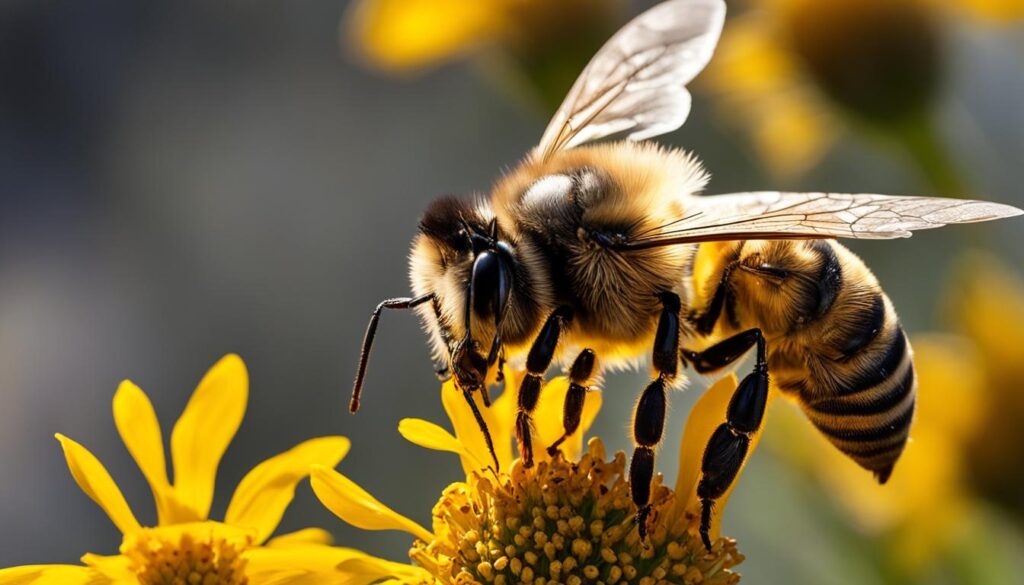
Essential Considerations for Beekeeping with Italian Honey Bees
Beekeeping with Italian honey bees requires careful hive management and regular inspections to ensure the health and productivity of the colony. Here are key considerations for successful beekeeping with Italian honey bees:
Hive Management:
- Provide a suitable hive environment that mimics the natural conditions for Italian honey bees, including proper ventilation and insulation.
- Regularly check the hive for signs of disease, pests, or queen health issues. Address any problems promptly to prevent the spread of diseases or decline in colony strength.
- Monitor the population size and ensure adequate space for the bees to thrive. If the hive becomes overcrowded, consider adding additional supers or expanding the hive.
Hive Inspections:
- Perform routine hive inspections to assess the health and behavior of the colony. Look for signs of a healthy queen, brood patterns, and the presence of pests or diseases.
- During inspections, check that the queen is laying eggs consistently and observe the workers’ behavior. Look for signs of aggression or unusual activity that may indicate issues within the colony.
- Take note of any changes in honey stores, ensuring the bees have ample food supply for the winter months. If necessary, provide supplemental feeding to support the colony.
Honey Extraction:
- Follow proper beekeeping practices when extracting honey to minimize stress on the bees and maintain the quality of the honey.
- Use appropriate beekeeping equipment, such as a bee escape or fume board, to remove bees from the honey supers before extraction.
- Ensure the honey is properly filtered and stored in a clean, food-grade container to maintain its freshness and prevent contamination.
Disease Prevention:
- Implement disease prevention strategies, such as regularly monitoring Varroa mite levels and using appropriate treatments to control their population.
- Practice good sanitation in and around the hive, including proper disposal of beekeeping equipment and regular cleaning to prevent the spread of diseases.
- Ensure the bees have access to clean water sources to prevent dehydration and contamination.
By following these essential considerations, beekeepers can maintain the health and productivity of their Italian honey bee colonies, contributing to the preservation of these remarkable pollinators and the art of Italian beekeeping.
Conclusion
In conclusion, the Italian Honey Bee Queen and Italian beekeeping play a vital role in maintaining bee colony health. Italian honey bees, known for their gentle nature, are preferred by beekeepers worldwide. Their exceptional honey production and adaptability to different environments make them highly sought after.
Italian beekeeping traditions, passed down through generations, emphasize sustainable practices that contribute to the overall well-being of honey bee colonies. By understanding the characteristics and behaviors of Italian honey bees, beekeepers can nurture thriving colonies and contribute to the conservation of these important pollinators.
Proper hive management, regular inspections, and disease prevention are essential for the success of beekeeping with Italian honey bees. Maintaining the health of the queen bee and the overall colony helps ensure the longevity of the hive. Implementing these practices, along with continued education, allows beekeepers to preserve the legacy of Italian beekeeping and the majesty of the Italian Honey Bee Queen.
FAQ
What are the characteristics of Italian honey bees?
Italian honey bees are known for their gentle nature and high honey production. They also exhibit good disease resistance and efficient foraging behavior.
Why are Italian honey bees popular among beekeepers?
Italian honey bees are popular among beekeepers due to their gentle behavior, abundant honey production, and adaptability to various climates.
Where can I purchase Italian honey bees?
Italian honey bees can be purchased from reputable bee breeders and suppliers. They offer hive packages or nucleus colonies that include a queen bee and worker bees.
What is the role of the Italian honey bee queen in the hive?
The Italian honey bee queen lays all the eggs in the hive, ensuring the growth and survival of the colony. She is crucial for the overall success of the hive.
Are Italian honey bees good pollinators?
Yes, Italian honey bees are excellent pollinators. They play a crucial role in pollinating a wide range of plants and contributing to ecosystem biodiversity.
What resources are available for learning about Italian honey bees and beekeeping?
Beekeeping associations and organizations provide valuable information and support to beekeepers. Beekeeping courses and workshops are also available for hands-on experience and knowledge.
How do I properly manage a hive with Italian honey bees?
Proper hive management requires regular inspections, monitoring hive health, and implementing disease prevention strategies. Honey extraction should be done following beekeeping practices.
What is the significance of Italian beekeeping traditions?
Italian beekeeping traditions have a rich history and emphasize sustainable practices. They contribute to the overall health and well-being of honey bee colonies.
Why are Italian honey bees highly sought after by beekeepers?
Italian honey bees are highly sought after due to their gentle nature, high honey production, disease resistance, and adaptability to different environments.


